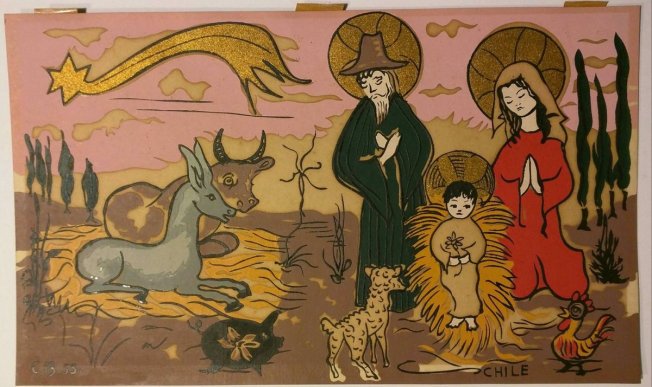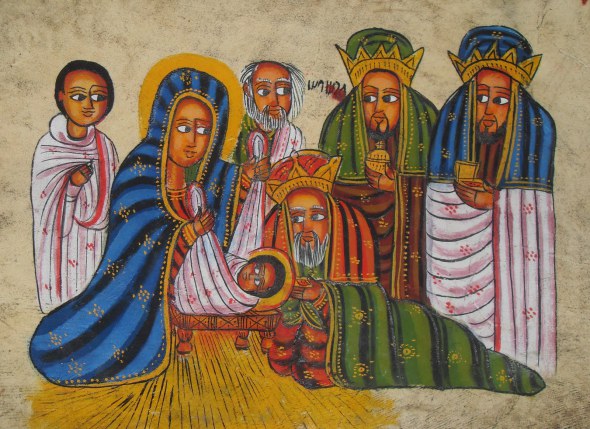“What Christmas Is All About”

John 1:1-4, 9-14 (1:14) – December 24, 2018
Christmas expectations can be wonderful. When we think of small—even middle-sized—children, they can be all wide-eyed and filled with amazement at the sense of wonder found in Christmas. That sense of wonder goes away somewhat as children get older, but then their expectations change, too. As people shift into adulthood, parenthood, and even grandparenthood, their Christmas expectations can shift even more.
What are your expectations of Christmas, this year?
I noted in one of my Advent sermons several weeks ago that December 9th was the 53rd anniversary of the first showing of the “Charlie Brown Christmas Special.” Over fifty years of this Christmas special has certainly affected how people in the United States view Christmas.
I wonder—how do we view Christmas? How are our expectations affected?
If we consider the people in and around Bethlehem on that first Christmas eve, there was a lot of hustle and bustle, a good deal of coming and going. The little town of Bethlehem was certainly a popular place, especially since the Roman law had been in effect for a while. Many descendants of King David needed to return to Bethlehem and register with the Roman government. We all know that Joseph was of the house and lineage of David, and that was why he was there.
We have heard about the shepherds, who were the first to receive God’s super-special birth announcement. They not only came to see the newborn King in a manger themselves, but they also alerted the whole town to the new birth, too. I suspect a goodly number of the people in Bethlehem had at least heard about the birth of a possible Messiah, by the time the shepherds were finished.
I wonder—what were their expectations, that first Christmas Eve?
We have the main players, Joseph himself, and Mary, his fiancée. The Holy Family. When the baby Jesus was born and the shepherds—and some others—showed up, I suspect Mary and Joseph were a bit perplexed at all the attention their Child was getting. What’s more, Dr. Luke records Mary treasuring up all these events in her heart, and reflecting upon them from time to time in the years to come.
I wonder—what were Joseph’s and Mary’s expectations from that first Christmas eve?
We shift from the common, ordinary smell of farm animals and the baby Jesus lying in a manger bed that Dr. Luke relates in the second chapter of his Gospel, to quite another scene. We shift to the first chapter of the Gospel of John. We shift from the warm, homey scene of a blessed Mother rocking her Baby to the time eternal before the heavens and earth began.
What kinds of expectations do we have from this particular retelling of the Gospel story, found in John, chapter 1? These verses, this retelling of the entrance into this world of the Messiah, goes like this: “In the beginning was the Word. The Word was with God. The Word was God. The light shines in the darkness and the darkness did not overcome it. To all who received Him, who believed in His name, He gave power to become children of God.”
Expectations of such cosmic significance! We go from the intimate, everyday retelling of Luke to the universal, cosmic retelling of John. Mind-blowing, to be sure. Most of the time, I cannot even begin to get my head around this eternal perspective.
The Apostle John was a mystic, a contemplative, and probably the least worldly of any of the disciples. It shows, in his writings. Yet, the beginning of John’s Gospel is a necessary part of the Nativity story. This cosmic retelling lets us know that Jesus broke into this world not only as a helpless Baby born in Bethlehem, but also as the pre-Incarnate Son, eternal from the time before the universe began, and eternal, to the time after the heavens and the worlds in the universe have all passed away.
One of my favorite expressions is “both/and.” I am uncomfortable with “either/or.” I do not like “black/white.” I much prefer “both/and.” Not either this, or that. Not either the Luke 2 Nativity, or the John 1 Prologue. But, both/and. Luke tells us of the very relate-able pregnant teenage mother, having her baby at a very inconvenient time. And at the same time, John tells us of the cosmic Christ, the Word, the One who spoke the universe into being at the beginning of all things. We have both. Often, too much for our puny human brains to grasp, but true, all the same.
What kind of expectations do we have from John’s cosmic retelling of the Nativity, in John chapter 1?
Let us draw closer in to the familiar Christmas story. Charlie Brown’s Christmas story. As with any cartoon, we need a villain. The villain in this cartoon special is no personification, no Abominable Snowman or Grinch, but instead the commercialization of Christmas. This is what is causing such angst and despair to Charlie Brown.
What does make Christmas? What kinds of expectations does Charlie Brown have?
Sometimes I feel like Charlie Brown at the Christmas pageant rehearsal. “Isn’t there anyone who knows what Christmas is all about?” I know Linus responds, “Sure, Charlie Brown. I can tell you what Christmas is all about.” He then recounts the Nativity narrative from Luke 2. Except—the blessed truth doesn’t penetrate into Charlie Brown’s head. Yet.
These whole four weeks of Advent we have been retelling the Nativity narrative from Luke, in anticipation of this very night. We have been singing the songs, and lighting the candles on the Advent wreath, all in preparation for this main event.
An Episcopal minister, the Rev. John Holton from Connecticut, uses this same Christmas special to relate the Nativity narrative. He says, “The good feeling, that warm fuzzy feeling I get watching A Charlie Brown Christmas is, at its core, a feeling of hope that even I could be loved. The hope—the knowledge—that God who sees even our unloveliness loves us fully. Loves us so much that God comes to be among us. As one of us. That God won’t let us go.” [1] Isn’t that the true meaning of Christmas? Isn’t that what Christmas is all about?
This is a gift that cuts through the commercialization of Christmas. Caring, compassion, and love for one another.
We can thank the Lord for God’s greatest gift, the gift to each of us of God’s Son, of God’s Love. And, we have the opportunity to bring glad tidings to all people right now, to people aching to hear of God’s love for them, for us, for all the world.
Won’t you share your expectation of Christmas with someone, tonight? Won’t you share God’s love with someone, today?
[1] http://www.christchurchnh.org/sermon/2017/12/28/thats-what-christmas-is-all-about-charlie-brown
(Suggestion: visit me at my regular blog for 2018: matterofprayer: A Year of Everyday Prayers. #PursuePEACE – and my other blog, A Year of Being Kind . Thanks!

